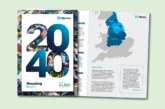New Futr survey highlights barriers to landlords delivering greater levels of resident experience.
The lack of both skills and quality data is holding back landlords who are attempting to digitally transform their organisations and better serve residents. A new survey, commissioned by conversation-as-a-service leader Futr, has found that the UK’s landlords see the value in digital services, but still have some way to go before they can properly implement them.
More than half (54%) of respondents said that a lack of digital skills and resources was their top barrier to digital transformation, closely followed by a lack of good quality/robust data, and a lack of investment (32%). However, this does not appear to be diminishing enthusiasm for the digital transformation process – just 2% of respondents had no strategy and no plans to implement one soon, while 40% had implemented a clear strategy, and 20% had developed the strategy but had yet to implement it.
“The focus on digital transformation is positive,” said Kitty Hadaway, Head of Sales for Housing at Futr, which commissioned the research. Over 80% of landlords had seen an increase in resident demand for digital products in the past 18 months.
Ms Hadaway said: “Landlords recognise the importance of delivering services and engaging with their tenants in a way that meets the needs and preferences of residents. Nine in 10 housing associations we spoke to said that it was very important for tenants to have a choice in how to contact landlords, and in today’s increasingly digital world that means complementing telephone lines with web, social, chatbots and messaging channels. But to deliver that in a coherent, integrated and consistent manner requires many to digitally transform.”
It was not just residents demanding digital means of communication; 90% of landlords said staff were also pushing for these services, highlighting how important digital transformation is in supporting teams to work effectively.
Ms Hadaway said: “A lot of people will often say that new technology means cutting jobs, but forward-thinking organisations will always see it as a way to augment their teams, not scale them back. Particularly when a lack of skills is a major concern, being able to introduce new services that help employees do their jobs, or focus on more complex matters, can help accelerate that digital transformation process while improving employee engagement. And that’s all on top of the boost to the customer experience.”
First Choice Homes Oldham has seen the benefits of pushing on with digital transformation. It deployed Futr’s chatbot and live chat services to support its contact centre team, going live in December 2020. Its customer satisfaction scores are averaging 89%, with the chatbot handling an average of 1000 customer interactions a month.









